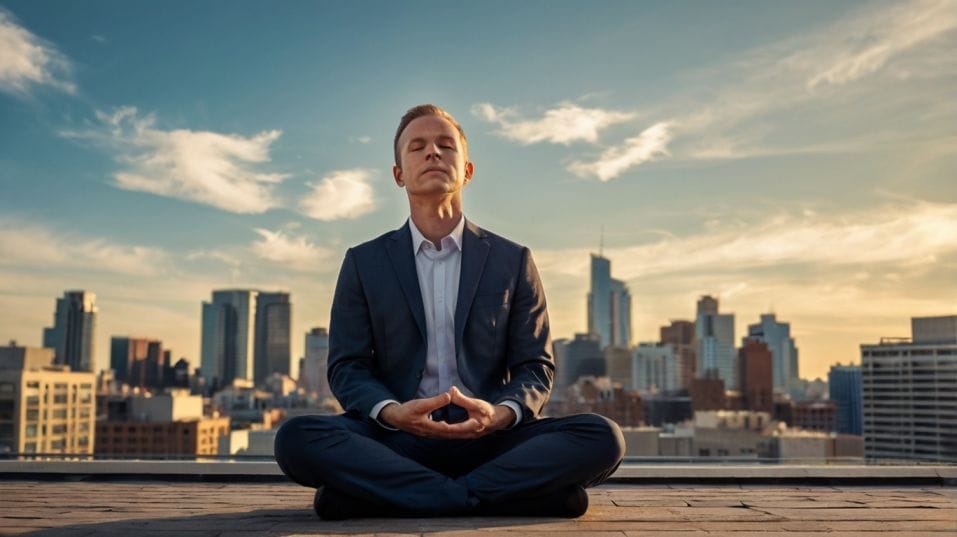The Role of Mindfulness in Managing Workplace Uncertainty
Learn how mindfulness helps manage workplace uncertainty. Discover techniques to stay calm, adaptable, and focused in times of change.

What if the uncertainty at work wasn’t something to fear but a tool for growth? Tight deadlines, shifting priorities, and unexpected changes can feel overwhelming, yet they also sharpen resilience and focus.
Mindfulness trains your mind to stay present, reducing stress and transforming uncertainty into an opportunity for clarity and decisive action.
Instead of dreading the unknown, you can learn to navigate it with confidence—starting with a simple shift in perspective.
Why Uncertainty Feels Overwhelming
The brain craves stability. When things feel unpredictable, stress levels rise, making it harder to focus, plan, or stay productive. The mind spirals into worst-case scenarios, fueling a cycle of overthinking and inaction.
This response is deeply ingrained—a survival mechanism meant to keep us safe. However, in a modern workplace, this instinct often backfires, leading to excessive worry rather than productive problem-solving.
Mindfulness interrupts this loop, anchoring attention in the present and helping you respond thoughtfully instead of reacting out of fear.
When you recognize uncertainty as a neutral event rather than a threat, your perspective shifts, allowing you to approach challenges with greater clarity and control.

Training Your Mind to Handle Change
Mindfulness doesn’t erase uncertainty—it shifts how you engage with it. Instead of resisting change, you learn to meet it with curiosity and presence. A few practical strategies can make a difference.
Shift Your Perspective
Instead of seeing uncertainty as a disruption, view it as a chance to grow. Change often brings new opportunities, insights, and skills.
Mindfulness keeps you from getting lost in fear-based thinking, allowing you to embrace the unknown with a clearer, more open mindset.
When uncertainty arises, ask yourself: What new skills can I develop in this situation? How can I turn this challenge into an advantage? This simple shift in thinking can dramatically alter how you experience change.
Additionally, cultivate cognitive flexibility—the ability to shift thinking patterns when faced with new circumstances. Instead of seeing obstacles, look for alternative solutions, fresh perspectives, and creative ways to adapt.
Practicing this regularly trains your mind to respond to uncertainty with a problem-solving mindset rather than resistance.
Use Your Breath as an Anchor
When stress spikes, the nervous system moves into fight-or-flight mode. Controlled breathing helps regulate this response, restoring balance and focus. Try this simple breathwork technique:
- Inhale deeply for four seconds.
- Hold for four seconds.
- Exhale slowly for six seconds.
- Repeat a few cycles to reset your nervous system.
Breathwork can be done anywhere—before an important meeting, during a difficult conversation, or in moments of doubt. With regular practice, it becomes an instant tool for reclaiming calm and focus.
For deeper relaxation, experiment with different breathing techniques such as box breathing, diaphragmatic breathing, or alternate nostril breathing. Each method offers unique benefits, from improving oxygen flow to enhancing mental clarity.
Control What You Can, Release What You Can’t
Worry thrives in uncertainty, fixating on things outside your control. Mindfulness redirects attention to what’s within your reach—your actions, responses, and mindset.
Instead of resisting change, acknowledge it, accept it, and channel energy into what you can influence.
One effective technique is the circle of control exercise. Draw a circle and write inside it everything you have control over—your attitude, effort, and responses.
Outside the circle, list everything beyond your control—company decisions, economic shifts, other people’s actions. Whenever you feel overwhelmed, revisit this list and focus on what’s inside the circle.
Additionally, develop an acceptance mindset. Uncertainty is a natural part of life. The more you practice letting go of the need for complete control, the easier it becomes to navigate unpredictable situations without unnecessary stress.
Take Mindful Breaks to Reset
Pushing through stress leads to burnout. Short, intentional breaks—deep breathing, a mindful walk, or a few moments of stillness—reboot your mental state.
Instead of feeling overwhelmed, you return to work more focused and adaptable.
Consider Integrating Micro-Mindfulness Moments Into Your Day
- Before opening emails, take a deep breath and set an intention.
- During meetings, focus on active listening instead of mentally preparing your response.
- After completing a task, pause for a moment of gratitude before moving to the next.
These small habits add up, creating a more mindful approach to work that fosters calm and clarity even in high-pressure situations.
For a more structured approach, schedule mindfulness breaks throughout your workday.
A quick body scan meditation at lunch, a few minutes of visualization exercises, or simply stepping outside for fresh air can dramatically improve stress levels and mental clarity.
Embrace Uncertainty as a Learning Opportunity
Every uncertain moment holds the potential for insight. Instead of resisting it, lean into the discomfort. What is this experience teaching you about patience, flexibility, or innovation?
By treating uncertainty as a teacher rather than an enemy, you transform challenges into stepping stones for growth.
Keep a Mindfulness Journal
Reflect on moments of uncertainty. Document what happened, how you felt, and what you learned. Over time, you’ll begin to see patterns of growth, helping you approach future challenges with greater confidence.
Incorporate self-compassion into this process. Acknowledge that uncertainty is challenging, but instead of harsh self-criticism, offer yourself kindness and patience. Remind yourself that adaptability is a skill that strengthens with practice.
Strengthening Resilience Through Mindfulness
Resilience is the ability to bounce back from setbacks with strength and clarity. Mindfulness plays a crucial role in this by keeping you grounded in the present rather than caught in fear of the unknown.
The more you practice mindfulness, the more naturally resilient you become.
Develop a Daily Mindfulness Routine
Include meditation, gratitude practices, or mindful movement (such as yoga or tai chi). These practices train your mind to stay centered, even when external circumstances are unpredictable.
Additionally, engage in positive visualization exercises. Imagine yourself successfully navigating challenges and adapting to change with confidence.
This mental rehearsal strengthens your ability to remain calm and resourceful in real-life situations.
Final Thoughts
Uncertainty is inevitable, but how you respond to it is within your control. Mindfulness builds resilience, helping you navigate change with clarity and composure.
Instead of resisting the unknown, embrace it as an opportunity to grow and develop new strengths.
Start today: The next time uncertainty hits, pause. Take a breath. Ground yourself in the present. A small shift in awareness can transform how you handle the unknown—starting now.




